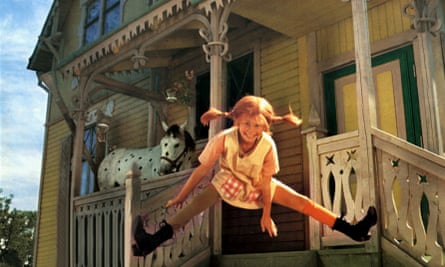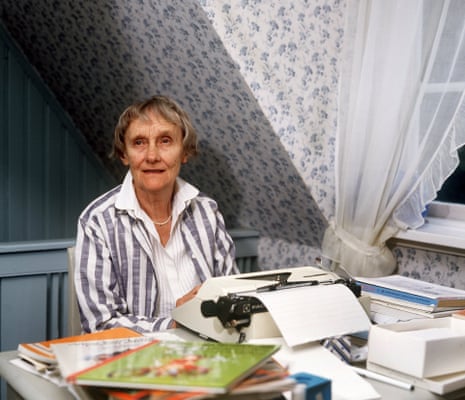The Swedish children’s author Astrid Lindgren will be forever linked with that irrepressible nine-year-old she unleashed on the world in 1945. Pippi Longstocking, with “hair the same colour as a carrot ... braided in two stiff pigtails that stood straight out”, lives all by herself in a tumbledown cottage, with a suitcase full of gold coins, free from school and other grey routines. Pippi’s cheerful dismissal of convention was an answer to overprotective parents everywhere, a proto-feminist manifesto and an affirmation of postwar optimism.
Lindgren’s wartime diaries, which lay neglected in a wicker laundry basket in her Stockholm flat for years after her death in 2002, reveal how Pippi emerged out of less happy times. The aspiring writer records her first entry on 1 September 1939 (“Oh! War broke out today”). Her last entries find her listening to live transmissions from Nuremberg and enjoying her first hints of Pippi’s fame.
Lindgren writes mostly as a guilt-ridden onlooker. She is constantly worried that Sweden will be drawn into the war; it stays neutral throughout, but this makes for strained relations with the country’s neighbours. Lindgren notes at one point that Sweden is suffering from “unrequited love” for Finland, bombarding its people with everything from knitted woollens to bottled blood and receiving only bitterness in return. Along with many other Swedes, she feels her country is a minnow trying to evade the jaws of two equally terrifying predators, Nazism and Bolshevism. “Germany will have to bear the blame in perpetuity,” she writes in December 1939, “for letting the Russian barbarians loose on Europe.”
The war begins with Lindgren hoarding cocoa, tea and soap, and there is some minor grousing about butter rations. But mostly she and her family – husband Sture, managing director of the Swedish motorists’ association, and children Lars and Karin – want for nothing. Their smörgåsbord overflows with lobster, liver pate, salt beef and goose liver, and at Christmas they feast on roast reindeer and black grouse. Lindgren itemises all this lavishness to make herself feel lucky and guilty; it makes the reader feel hungry.

Even for a diary written in interesting times, Lindgren’s is unusually focused on others, almost to the point of self-erasure. She spends most of it trying to imagine the unimaginable: the pain and fear of people caught up in life-or-death battles. “God help our poor planet in the grip of this madness!” she writes in her very first entry, one of many helpless-sounding prayers. She seems as pained about the firebombing of Hamburg as she is about Norwegian Jews deported to Poland, for “misery knows no borders”. And she has a writer’s filmic sense of sorrow unfolding across the Earth all at once: “We currently have fighting in the Russian forests, the Libyan desert and on sunny Hawaii. And it all started because the Germans wanted Danzig.”
It helped that Lindgren worked at the secret postal control division, as a censor of military and private post sent to and from other countries. So she had first dibs on war news, and much of the book is simply a careful record of what is happening in the different theatres of war. Something of an anglophile, with a soft spot for Neville Chamberlain, that “nice old gentleman who was always running late”, she begins her most significant announcements with the English words “Things have happened”. In her quiet doughtiness and no-fuss decency, she resembles Jan Struther’s Mrs Miniver in one of the books she manages to get hold of from Britain. Unlike Mrs Miniver, though, her concerns are mostly unquotidian. Instead, in crisp, limpid sentences (deftly translated into English by Sarah Death), Lindgren narrates all the news of the war as it arrives in her peaceful bit of Stockholm.
I did long to learn more about Lindgren. Diaries are often compelling historical documents because they show precisely how the hard facts of geopolitics bump up against the idiosyncrasies of daily life. Untroubled by the historian’s reaching after pattern and meaning, diarists frequently juxtapose the public and private, the momentous and banal, in fresh and revealing ways. But Lindgren is too self-effacing to dwell on her own life too much. We read a little about the birth of Pippi Longstocking, conceived in the spring of 1944 when she finds herself bedridden and bored with a sprained foot, and written as a present for her then nine-year-old daughter Karin, who she worries is becoming “nervy” and “dotty”. She delivers sporadic progress reports about the book thereafter, but anyone looking for insights into her creative process will be frustrated.
When she does write about herself, the narrative is teasingly incomplete. In August 1944 she declares that “a landslide has engulfed my existence”. That Christmas, she sheds bitter tears into the herring salad. And then, after going on sick leave for neurosis and insomnia, she decides abruptly that the private war with her husband, Sture, has ended in “victory for me”. Even for a diary, a form generically disposed to go off on tangents and leave stories unfinished, it feels unforthcoming.
Overall, though, this book about the random and numberless cruelties of war left me feeling oddly cheered. This year may feel like an annus horribilis to some of us, but it has nothing on 1940. Lindgren has dark thoughts about what will happen when the war is over and “how hard it will be to inherit a bloody, hideous wasteland of a world, gassed and wretched in every way”. That is what is so sad about diaries: their keepers can never find out how the story ends. We know, of course, what Lindgren could not have known then – that she would go on to become a much-loved and translated author, an important voice for animal rights and children’s welfare, a jewel in Sweden’s cultural life. And the world, which she feared would be “so full of hate that it chokes us”, recovered, more or less – to be as irrepressible as Pippi Longstocking herself.

Comments (…)
Sign in or create your Guardian account to join the discussion